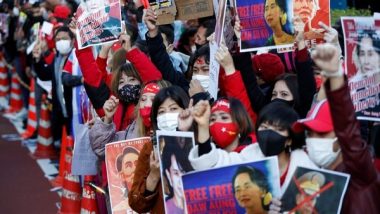Naypyidaw [Myanmar], June 24 (ANI): One of the most significant aspects of the 2021 military coup in Myanmar was China's immediate assistance to the military by providing advisers and subsequently, military equipment. It must be said that China's links with the Tatmadaw in Myanmar are historical. The government of the National League for Democracy (NLD) was only an interlude in this relationship.
The strategic perspective of the current relationship is a clear anti-India stance. China has used Myanmar's Army to harm India's interests, both in terms of security and economic cooperation. These developments can be viewed against the backdrop of a recent statement by China that it pledges to support the military regime "no matter how the situation changes" in Myanmar over the coming months and years.
In a statement issued on April 4, China also affirmed that it had always placed Myanmar in an important position in its diplomacy and wants to "deepen exchanges and cooperation to forge a China-Myanmar community with a shared future."
China's statement marks the most unambiguous signal of support for Myanmar's military, which continues to face fierce resistance from a broad coalition of resistance groups, pro-democracy activists and ethnic armed organizations. Associated Press reports, Foreign Minister Wang Yi having told his Myanmar counterpart Wunna Maung Lwin that, China "has always placed Myanmar in an important position in its neighbourly diplomacy" and wants to "deepen exchanges and cooperation."
China's unequivocal support at this juncture for the military government reflects its assessment that the Tatmadaw will continue to prevail over the anti-coup resistance. They also assess that outside support for the resistance movement will only prolong the inevitable, and that the military regime offers the most likely path to stability which is necessary for advancement of China's economic and strategic interests.
The essence of this Chinese commitment to Myanmar's Army is to create an overland transport and communications corridor running from China's Yunnan province to Myanmar's Indian Ocean coast, which is part of the China-Myanmar Economic Corridor (CMEC), a sub-pillar of the Belt and Road Initiative.
It is important to note that China had been initially reluctant to back the military regime and its leader Senior General Min Aung Hlaing. But attacks on Chinese companies and investment, including factories in Yangon's industrial zone, marked a major turning point for China, raising concerns about instability in the country. Protests outside China's Yangon embassy and a rise in anti-China sentiment in the wake of the military takeover only increased their concerns.
Resultantly, by August 2021, the same month that Senior General Min Aung Hlaing crowned himself Prime Minister, Chinese officials had begun to restore ties with the military administration. Chinese authorities and business lobbies in Yangon also began to engage publicly with junta officials and promote commercial opportunities. In December, China delivered to Myanmar's Navy a refurbished Ming-class submarine, renamed the UMS Minye Kyaw Htin, making Myanmar the first country in Southeast Asia to take delivery of a China-manufactured submarine.
Since the coup, Chinese officials and business lobby groups in Yangon have begun to engage publicly with junta officials and to promote commercial opportunities. Since the early 2000s, Myanmar has sought to acquire a fleet of submarines to keep up with its Southeast Asian neighbours, but it has few options to buy them due to its atrocious human rights record and the arms embargo imposed by the European Union.
Along with Russia, China has also provided the military regime with fighter jets and armoured vehicles. China is continuing to pursue what it calls an independent foreign policy of peace that generally prioritizes its own narrow interests, with little or no consideration for a country's human rights record or other internal controversies.
The current state of play is that three strategic areas of collaboration and cooperation between the two countries define the relationship. First, in its incipient stage, is the Chinese digital Renminbi (RMB). Along with the recent agreement establishing the RMB as the official settlement currency for trade with China, the digital RMB could help Myanmar in its attempts to reduce its dependence on the US dollar in trade and mitigate against potential restrictions to access to the SWIFT international payments system.
The second area is Myanmar's retail sector, which is now a strategic front of China's private sector. The e-Commerce platform shop.com.mm, which is owned by China's Alibaba, has already captured the lion's share of the Myanmar market, particularly by allowing digital payments during the 2021 cash crisis.
Third, China has transferred to Myanmar the technology to manufacture a China-made Covid-19 vaccine under the brand name Myancopharm. With few competitors, China's Covid-19 diplomacy in Myanmar has been a relative success that has opened the way for new Chinese pharmaceutical companies to invest in Myanmar's generic drugs market, which is still dominated by imports from India.
Although it may take some time to gain the market share, entrepreneurs are already looking for an alternative source of generic drugs. Myanmar has a very high demand for generic drugs, but the steep US dollar-Kyat exchange rate had made imports more expensive.
China has also signed a deal to provide USD 6.1 million to Myanmar for 21 development projects. Furthermore, the government has approved a US$ 2.5 billion China-financed liquefied natural gas power project in Mee Lin Gyaing in Ayeyarwady Region.
Investments from China provide a facade of legitimacy to the military-led government, which is otherwise bereft of investments from any other source. While the coup has boosted China's presence in Myanmar, it has significantly undermined India's economic and security interests in Southeast Asia. The civil war has made progress on India's economic and logistics projects in the country, which are central to India's Act East policy, all but impossible.
Furthermore, fighting between the Myanmar military and People's Defence Force (PDFs) has brought intense conflict to western and north western Myanmar, which border India. China's blind support for the brutal and autocratic government will only aggravate the situation in Myanmar further. China's self-aggrandizing ambition is a threat to the people of Myanmar and their democratic aspirations. (ANI)
(This is an unedited and auto-generated story from Syndicated News feed, LatestLY Staff may not have modified or edited the content body)













 Quickly
Quickly

















